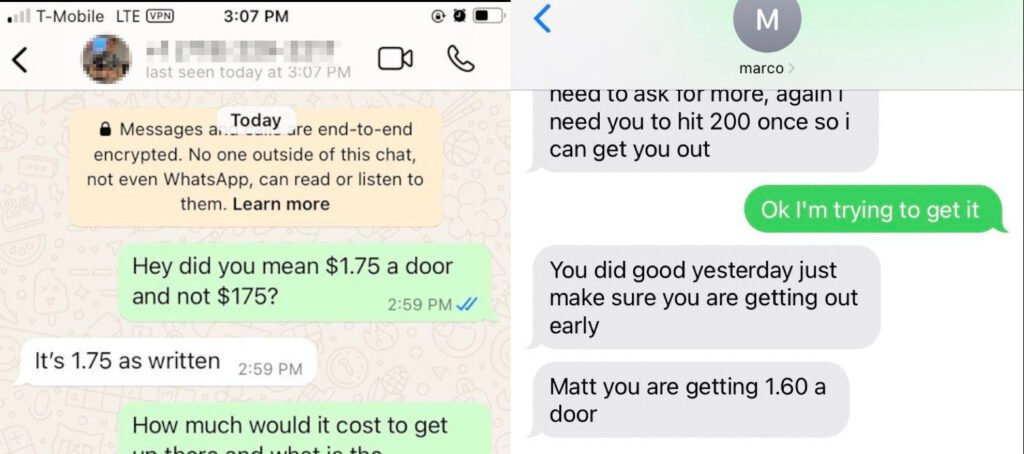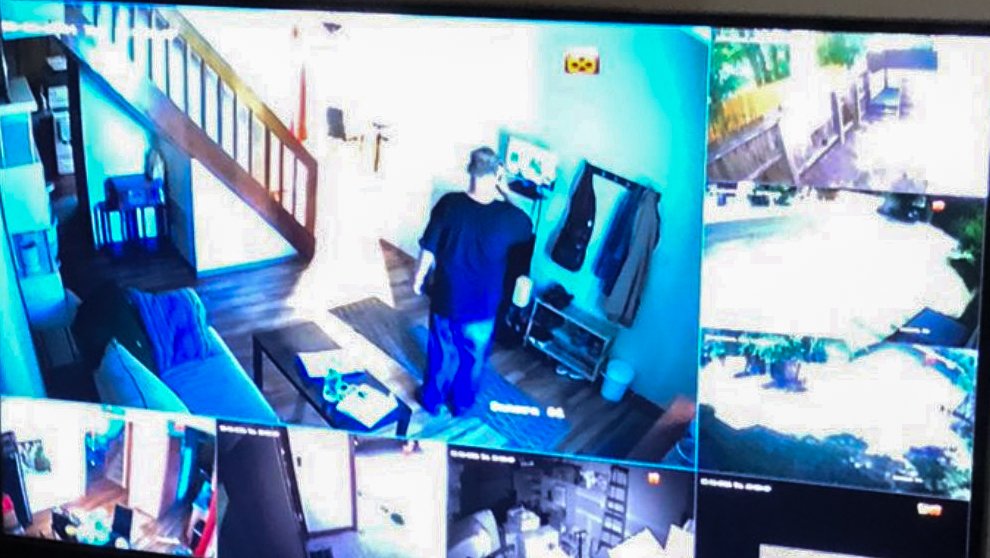Cover photo: Canvassing worker Matthew Dimitri watching himself via surveillance system installed inside the house his boss rented to him.
In the months leading up to the 2024 US presidential elections, Elon Musk financed a frantic scramble to collect electoral data and get out the vote for Donald Trump. Contracting a variety of vendors across multiple states, his America PAC soon became one of the primary controversies surrounding the elections. Founded on July 9, 2024, the newborn Political Action Committee (PAC) faced several lawsuits alleging criminal campaign tactics, as the world’s richest man threw in more than $250 million to get Trump in the Oval Office.
America PACs hastily organized, multimillion dollar, canvassing campaign relied on a web of subcontractors and out-of-state workers who were deployed in key battleground states—including Wisconsin, Pennsylvania, and Michigan—as paid door knockers. The corporatized campaign to get Trump re-elected became a groundbreaking showcase of money-driven electoral culture in the wake of the Federal Election Commission (FEC) lifting long-standing campaign financing regulations earlier this year. The new guideline enabled PACs to coordinate canvassing work and share electoral data directly with election campaigns. In effect, it allowed Musk and other billionaires in his surroundings to commit unlimited funds to the costly and labor-intensive canvassing, data extraction, and door knocking operations of Trump’s campaign. An inside view at this voting drive reveals a world of chaos and questionable practices.
“It was all horrible, everyone above me was just so disorganized. They just worked us like slaves and we did not get compensated fairly at all,” said Matthew Dimitri, a 32-year-old Coloradoan, after the elections were over. Starting in June, Dimitri worked as a seasonal canvasser for a small Colorado Springs based company Pivotal Politics. Through a chain of subcontractors, he eventually became one of the door knockers America PAC and its main canvassing contractor, the Republican-aligned Blitz Canvassing, mobilized in Wisconsin and Michigan to help tilt the vote in Trump’s favor.
Nearly two months after his work for Pivotal Politics in the summer ended, Dimitri had become indebted to his boss who had also become his landlord, owing him approximately $1,400 at the time of publication. He claims his boss used the rental debt as a leverage to coerce him to accept out-of-state work at America PACs pro-Trump campaign in September. Dimitri says he was misled about the real earnings. According to him, his boss at Pivotal Politics promised a $4,000 reward for two days of work in Wisconsin. His real earnings ranged in hundreds per week, depending how many doors he knocked, after nearly a month of work in multiple states.
America PAC and its subcontractors have been accused of abusive working conditions and sued for labor violations. Talking to Wired Magazine, other workers at Blitz Canvassing said they learned they would campaign for Trump only after signing non-disclosure agreements. Stranded in Michigan, they were allegedly threatened with losing their company-provided accommodation for failing to meet unrealistic voter engagement targets. Starting in September, Turning Point followed Dimitri’s work journey across three different states to gain deeper insight into Elon Musk’s novel campaign that was outsourced to him and other super PACs instead of the Republican National Committee who usually ran get-out-the-vote operations.
Employed as an “independent contractor,” Dimitri was not entitled to overtime compensations or standard safeguards of employment contracts. Despite working 60-80 hours a week, he returned the lion’s share of his earnings back to his employer for rent and was not compensated for necessary work-related expenses, such as accommodation and transportation costs. He met a fellow out-of-state worker sleeping in his car despite being promised a hotel room. At times, Dimitri’s salary hardly covered the direct expenses of conducting his work, according to receipts reviewed by Turning Point. There were also days that he was not given any working hours at all.
Colorado
While Elon Musk was finalizing the setup of his America PAC in June 2024, Dimitri was in acute need of seasonal work. Looking through local job markets, he had come across Pivotal Politics, a small company in Colorado Springs which marketed itself as the “ultimate partner for political canvassing and petition campaigns.”
Dimitri applied under the impression that the company would be running local campaigns and surveys for a broad range of candidates and issues. Little did he know that his path would cross Trump’s campaign or America PAC, or that he would be expected to work in other states. In early June, he started knocking doors around Colorado Springs, trying to get a variety of third-party candidates on the ballot in the state. He also rented a room from his boss. Then, his work hours suddenly dried out in mid-Summer.
“After I signed the lease, a week later, Pivotal Politics/Blitz announced in a [Whatsapp] group chat that there would be no more work ‘till the near future,” Dimitri said. “I had just signed the [contract] that locked me in the lease, but I had no income.”
The piling rent bills his boss issued were signed by “Marco’s Room Rental,” but there is no registered company with that name in the state of Colorado. The room Dimitri rented is located in the same address where Pivotal Politics LLC corporate office is registered, and the rent was paid to Marco Granger-Rivera’s personal account. Granger-Rivera is the registered agent of Pivotal Politics, the owner of the property, and the executive manager of Dimitri’s canvassing work at the time.
Dimitri said he was alarmed by the fact that the rental apartment had an inward-facing security system, with video cameras monitoring common rooms (cover photo). The landlord being his employer, Dimitri grew nervous not knowing if the system recorded audio as well, and if he could safely discuss work-related problems, such as the sudden lack of shifts and income, on phone at home. The other residents were not employees of Pivotal Politics as far as Dimitri could tell. There is no indication that other America PAC subcontractors commingled landlord and employer roles.
After staying without work shifts in mid-July, Dimitri started to search for other jobs and sources of income. Finally, in September, Granger-Rivera approached him with a suspiciously lucrative offer. He wanted Dimitri to take subcontracted gigs from America PAC and Blitz Canvassing in other states. At that point, Dimitri already owed him overdue rents.
“He had coerced me to go there because I owed him all that rent,” Dimitri said later in December. “Once I got there, it [became] more explicit. He was basically saying I have to do this.”
When Dimitri found out that the Blitz Canvassing-linked Pivotal Politics was effectively an organ of the Trump campaign, he contacted Turning Point to offer an inside view to Elon Musk’s operation. He said Granger-Rivera was persuading him to take the work by promising up to $4,000 earnings for a two-day work trip in Wisconsin. However, it soon turned out the estimate was based on far-fetched amounts of door knocks per day. Also the trips turned out longer than initially marketed.

Wisconsin
On September 29, Dimitri flew from Colorado to Wisconsin for a two-days work trip that eventually extended into a nearly one-month journey across multiple states. Upon arrival, Granger-Rivera had him rent a car and head to a hotel, though soon after he called Dimitri again, telling him to turn back and pick up another canvasser from the Milwaukee Mitchell International Airport.
”I met Gustavo at the airport, and I didn’t know that we would share a hotel room until after the orientation that day. I thought I had the room for myself,” said Dimitri. Although he did not mind sharing the room with his coworker, he started growing anxious about the arbitrarily changing working conditions. One of the pamphlets spread in the orientation event told the workers not to talk with the press.
”About three days in or so, we decided to let another guy stay with us, because we felt sorry for him because he was [sleeping] in his car,” Dimitri said referring to an out-of-state canvasser who slept in the hotel’s parking lot. “He was told that he would have a hotel room but he didn’t. He was one of the three Venezuelans I met.”
”I got the contract signed [only] until three or four days into working in Wisconsin. It was like ‘by the way, you have to sign this,’” Dimitri continued. The “independent contractor agreement,” signed on October 4, 2024, levied accommodation and transportation costs, and basically all other work-related expenses, on Dimitri. The contract also demanded him to pay work-related expenses, such as rent for the car, to the company even if the expenses exceeded his salary.
According to a rental agreement seen by Turning Point, Pivotal Politics charged $836.04 for a week’s rent of a car which was necessary for Dimitri to canvass multiple neighborhoods and counties. Dimitri said he also paid between $25 and $30 a day for fuel on the days he drove. While other Blitz workers have reportedly had their lodgings covered by the company, it is unclear why accommodation was not provided for Dimitri and his fellow workers. It is also unclear whether Blitz covered the accommodation costs to Pivotal Politics.
The arrangement between Blitz Canvassing and Pivotal Politics was not transparent to the workers. Even though Blitz paid Dimitri’s salary and had executive authority over his work, his contract was signed with Pivotal Politics LLC without a mention of Blitz Canvassing (or America PAC). It was also not transparent what financial arrangements the two companies had between them. While different costs were systematically subtracted from his salary, Dimitri’s earnings fell significantly below the marketed $4,000, ranging in hundreds per week.
”He coordinated with Justin [Prather] from America PAC, my boss in Wisconsin, right before we got paid,” said Dimitri. “Justin was like ‘I need to confirm a few things with Marco [Granger-Rivera] before I can pay you,’ which meant that he probably got the money before it was sent to me.”
On October 3, when Dimitri was already working in Wisconsin, Granger-Rivera sent him a text message, saying “Matt you are getting 1.60 a door,” without further explanation. While the compensation rate was initially agreed to be $1.75 per door, Dimitri’s contract with Pivotal Politics—signed the day after Granger-Rivera’s text message—reduced the rate at $1.60 per door, raising the question if Pivotal Politics took an additional $0.15 cut from each knocked door, acting as a middleman between Dimitri and Blitz.
Neither Granger-Rivera nor Justin-James Prather commented to Turning Point about the arrangements or other aspects of the story. Granger-Rivera did not respond to repeated interview requests. “Sorry. I have signed NDAs regarding the contract. Have a nice day,” replied Prather in a text message, referring to a non-disclosure agreement with the company.

Through Washington to Michigan
From Wisconsin, Dimitri’s journey continued to Seattle, Washington. When Dimitri landed, he was picked up at the airport by Granger-Rivera. He canvassed the next day and, on October 11, he picked up Granger-Rivera from the airport early in the morning.
According to Dimitri, Granger-Rivera said he wanted to put unnamed “Argentinians” to work in Seattle pretending to be him, while he would begin canvassing in Michigan. Dimitri says that in the parking lot of a Panera Bread in Seattle, Granger-Rivera angrily warned him not to mention “the Argentinians” to anyone.
“He made me sit in silence while he held a zoom conference meeting and made me get him a straw and napkins. Then grudgingly handed over the steak and egg burrito he bought me,” said Dimitri. After leaving the Panera Bread, Granger-Rivera used Google Translate to talk with the Argentinians on his phone in the car with Dimitri in the passenger seat. Granger-Rivera told Dimitri he would “never meet” the Argentinians.
”I think he was trying to scam me and the Argentinians… and Blitz. He was asking my app login stuff so they could log in [to my account],” said Dimitri. He referred to the Campaign Sidekick and Canvasser apps which are used for performance monitoring and surveillance. According to Dimitri, he received calls from an auditing company about irregularities in his statistics, such as door knocks on unusual times (05:30 am), in the following days.
After the exchange in the car, Granger-Rivera left Dimitri to wander at a mall for several hours, and finally picked him up and dropped him off at the airport to catch the flight to his new destination.
As the Argentinians prepared to go to Seattle to do Dimitri’s door-knocking, he flew to Las Vegas, Nevada, and had a 7 hour layover before his flight to Detroit, Michigan. There, Dimitri spent two days at an AirBnB.
In Michigan, after finishing his training around 11 am, he “had to wander around like a homeless person” between the run-down orientation building and other businesses. For transportation, he was given a rental car that was in fact assigned on his coworker’s name. While handing over the keys, the coworker did not know if the car rent had been paid for further lease and warned Dimitri that he may get arrested if stopped due to the unpaid lease and the car not being in his name.
”I feel I’ve been human trafficked, because I was told I would only be out of town for two days in Wisconsin. It’s been nearly three weeks […] going across multiple states,” Dimitri lamented on a video he recorded on October 17. “My account is constantly going negative, I am constantly having to ask my family for money […] This is like a cult.”
While in Detroit, Dimitri had worked nearly 80 hours the earlier week and was compensated only $393. According to him, the payments were late and he and his coworkers had to “keep calling frantically” to get paid. Payment receipts confirm he received the $393 in two patches on October 12 and 13 from Justin-James Prather on PayPal. Dimitri started to grow tired of earnings consistently falling to a fraction of the marketed compensation.
”It was really bad [already] in Colorado. We would never get paid for overtime. I worked 60 hours one week and my skin ripped off in some parts [because of sunburn], and I only got paid like $575,” he said.
Dimitri’s work in Michigan would eventually come to an end after America PACs auditors, following him on the streets by car, caught the frustrated canvasser falsifying data on the Campaign Sidekick app on the fifth and final day of his work. The company decided to appropriate his salary for the day and for the full four-days work he had done in Michigan before the incident.
Dimitri spent the last three nights in an AirBnB in Milford but still had to drive eight hours to Milwaukee to return the rental car he had used but which was not in his name. His requests for gas money were ignored by his boss for nearly 24 hours, causing him to miss his flight from Milwaukee to Denver.
“Bro, how are you going to make that? Bro, you should have left at 4 A.M., it’s an 8 hour drive,” Granger-Rivera said in text messages to Dimitri. After missing his flight, Dimitri replied “there isn’t a frontier flight available til Thursday and it has to be rebought.”
“Sit tight I’ll re book for Thursday, sounds like you have a 30 hour layover,” Granger-Rivera responded. The layover at the airport ended up lasting for three days.
Back in Colorado
Trump ended up winning Michigan and Wisconsin, as well as Pennsylvania, North Carolina, Georgia, Nevada, and Arizona which were all considered among the key battleground states of the presidential race. All the seven states were targeted by America PAC.
Elon Musk and America PAC’s concrete impact in Trump’s revanche is still debated and evaluated. However, the billionaire, whose main clients include US government agencies, was awarded for his quarter of a billion effort with an unofficial position in the incoming Trump cabinet. His personal wealth has increased by 66% from $264 billion to $440 billion since Trump’s victory declaration.
Musk has vowed his new political arm America PAC will remain active in American political life. Reportedly America PAC is about to focus on targeting democratic district attorneys and midterm elections next. The PAC has not commented whether it will continue to organize canvassing campaigns with Blitz Canvassing, from which it bought services for $9 million during the presidential elections, according to its filings to the Federal Election Commission.
Blitz Canvassing has partially admitted sub-standard working conditions in Michigan, when they were first exposed by Wired magazine. Shortly afterwards, the company mass-fired all the workers in the canvassing group from where the leak came, stranding them in Michigan without income, return tickets, or accommodation, and “with little explanation beyond a complaint that someone had spoken with the press.”
Pivotal Politics took down its entire website after the presidential elections were finished. There are hardly any visible signs of the company or its activities, besides its founding documents at the Colorado Secretary of State office and old screenshots of its homepage at Internet Archive’s wayback machine.
According to the documents at Colorado Secretary of State office, Pivotal Politics LLC was registered on April 3, 2024, just before the campaign season for presidential elections. Granger-Rivera had his petitioning license registered on May 5, this year. There is no publicly available information about Granger-Rivera having professional experience in the canvassing and campaigning sector outside the past half-year venture with Pivotal Politics. Last year, he was still working as a courier for Amazon and involved in a class action lawsuit against the corporation for abusive working conditions.
After his nearly one-month journey across the country, Dimitri is back in Colorado Springs. He has already started a new job and is currently paying back his debt to Granger-Rivera and searching for a new apartment. He does not plan to return to canvassing work for upcoming elections.
Edit 22.12.: Minor timeline corrections and updates with more details. One major edit (on timeline) regarding three days layover in Milwaukee when Dimitri returned from Michigan to Colorado.

Patrick Hilsman
Researcher and journalist focused on conflicts, arms traffic and refugees. Hilsman has covered the conflicts in Syria and Ukraine, and works currently as an editor at Turning Point.
Henri Sulku
Henri Sulku is an editor of Turning Point with focus on political economy, people’s history, and resistance movements.




